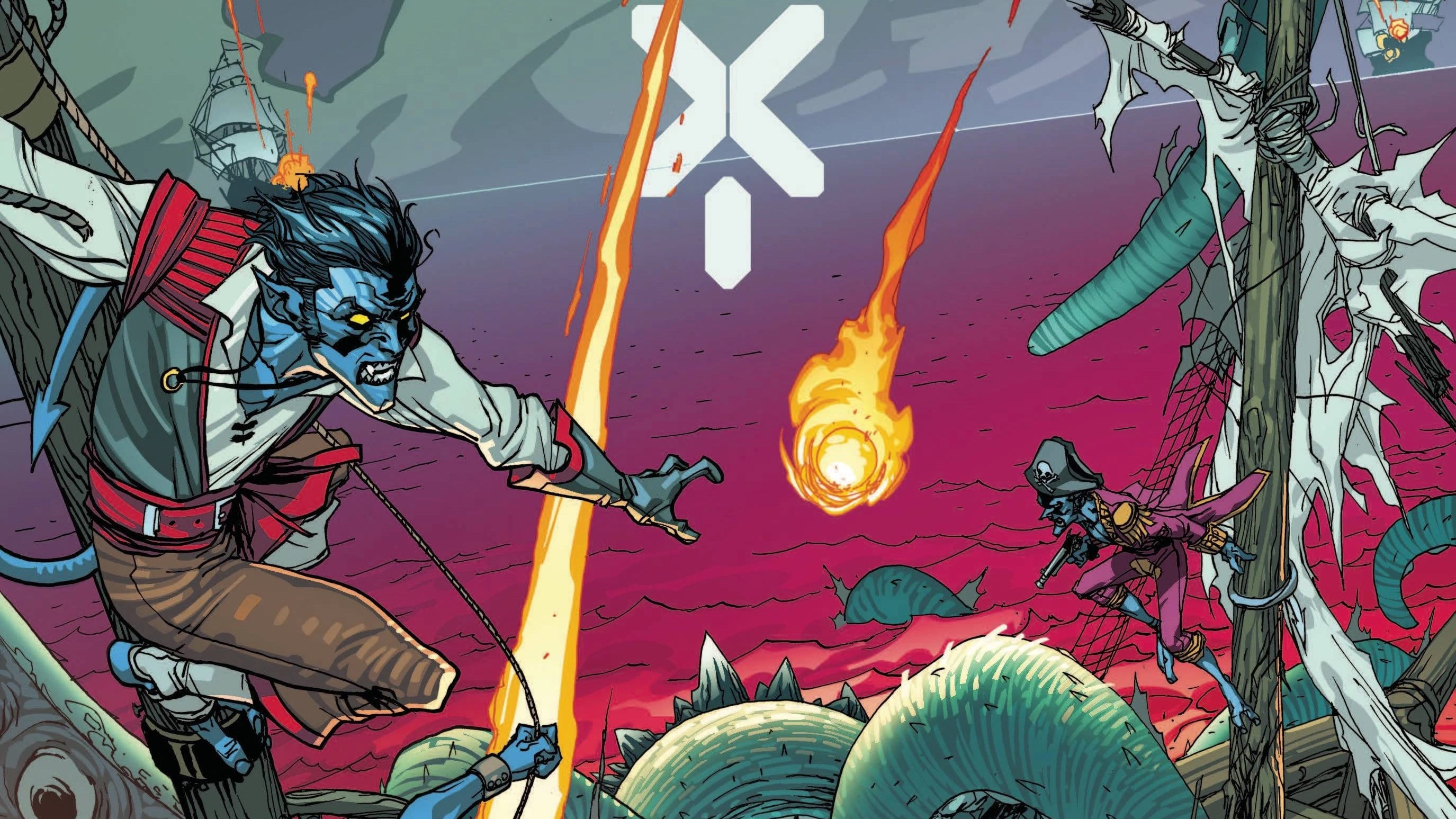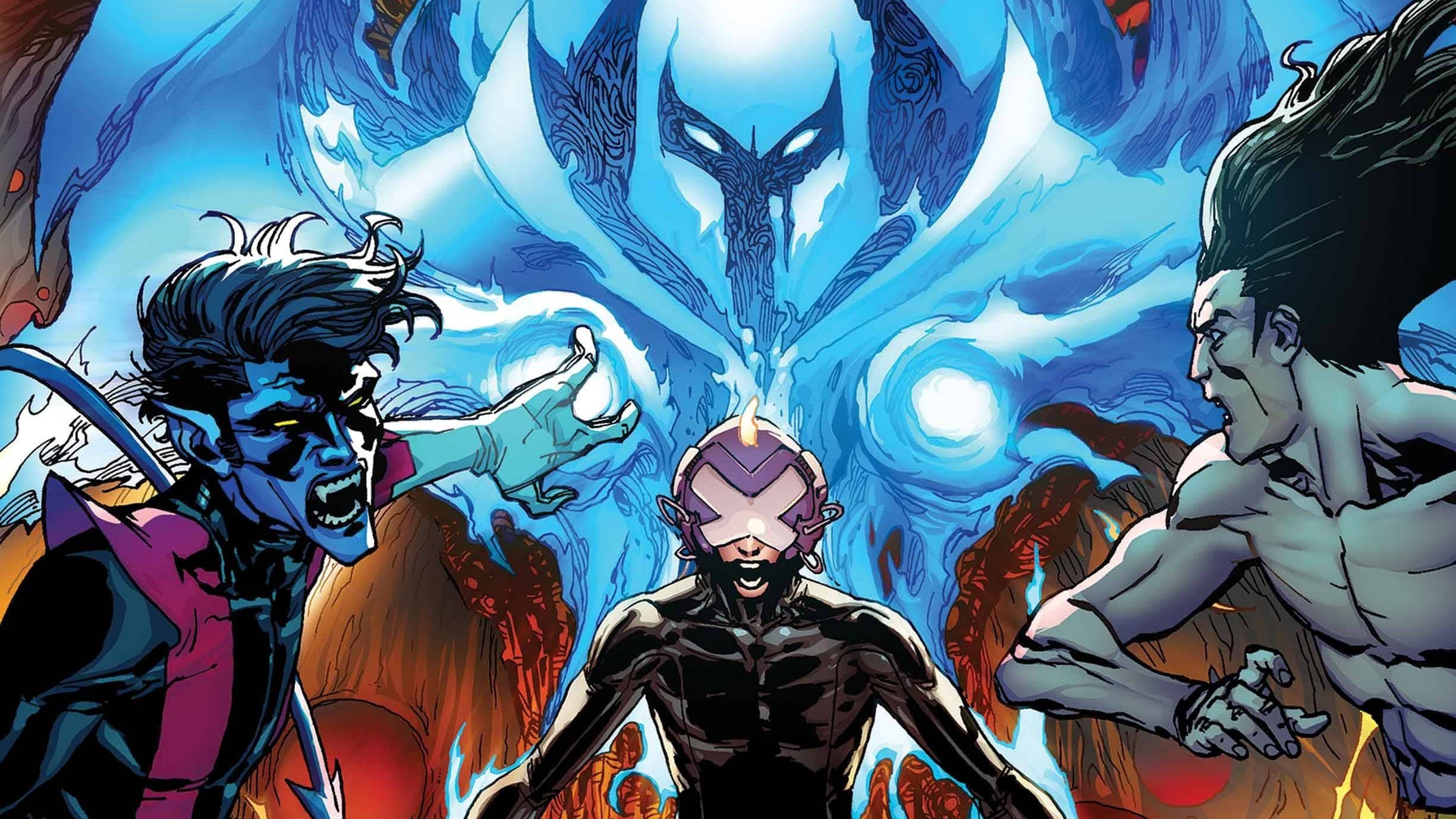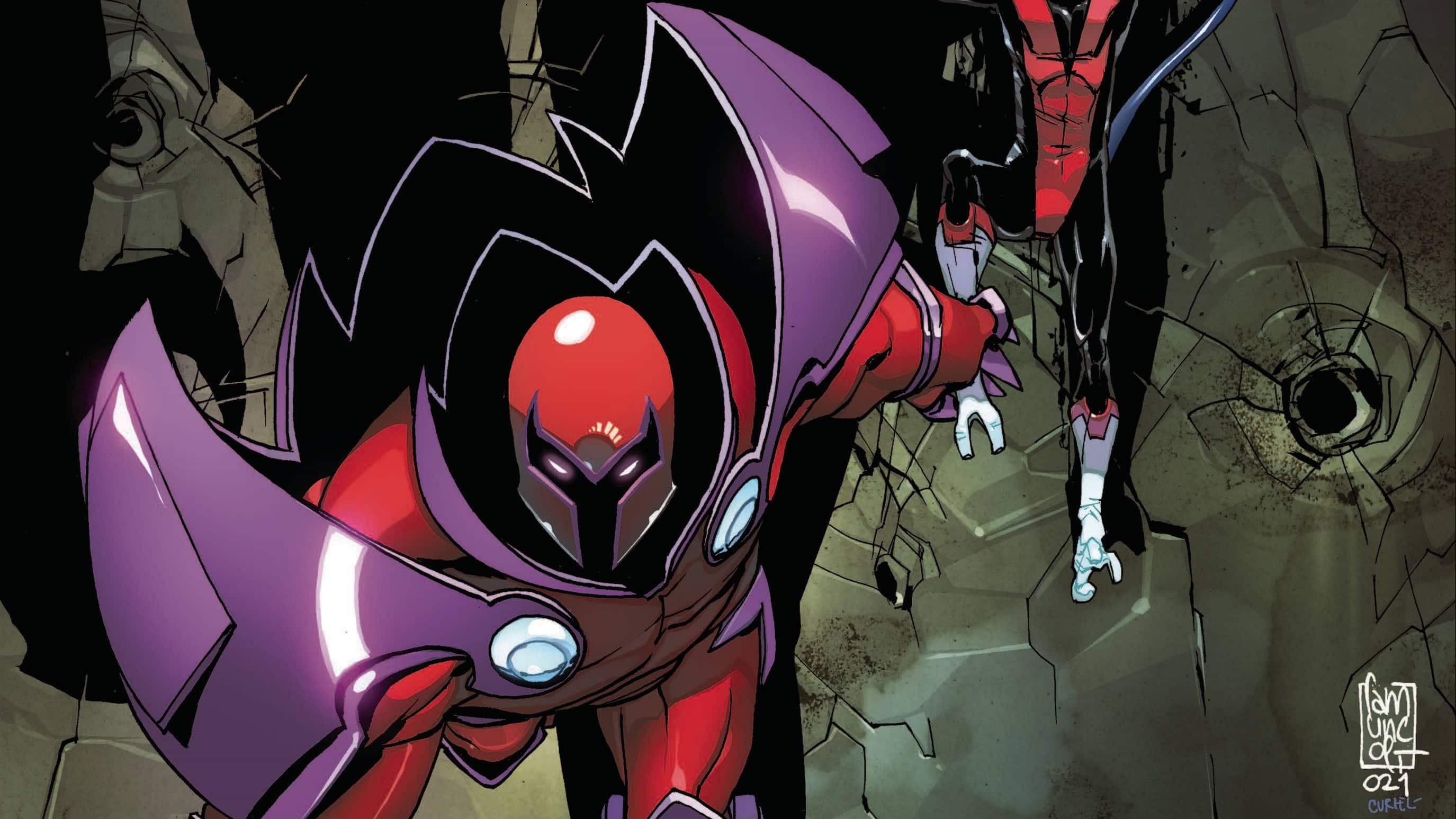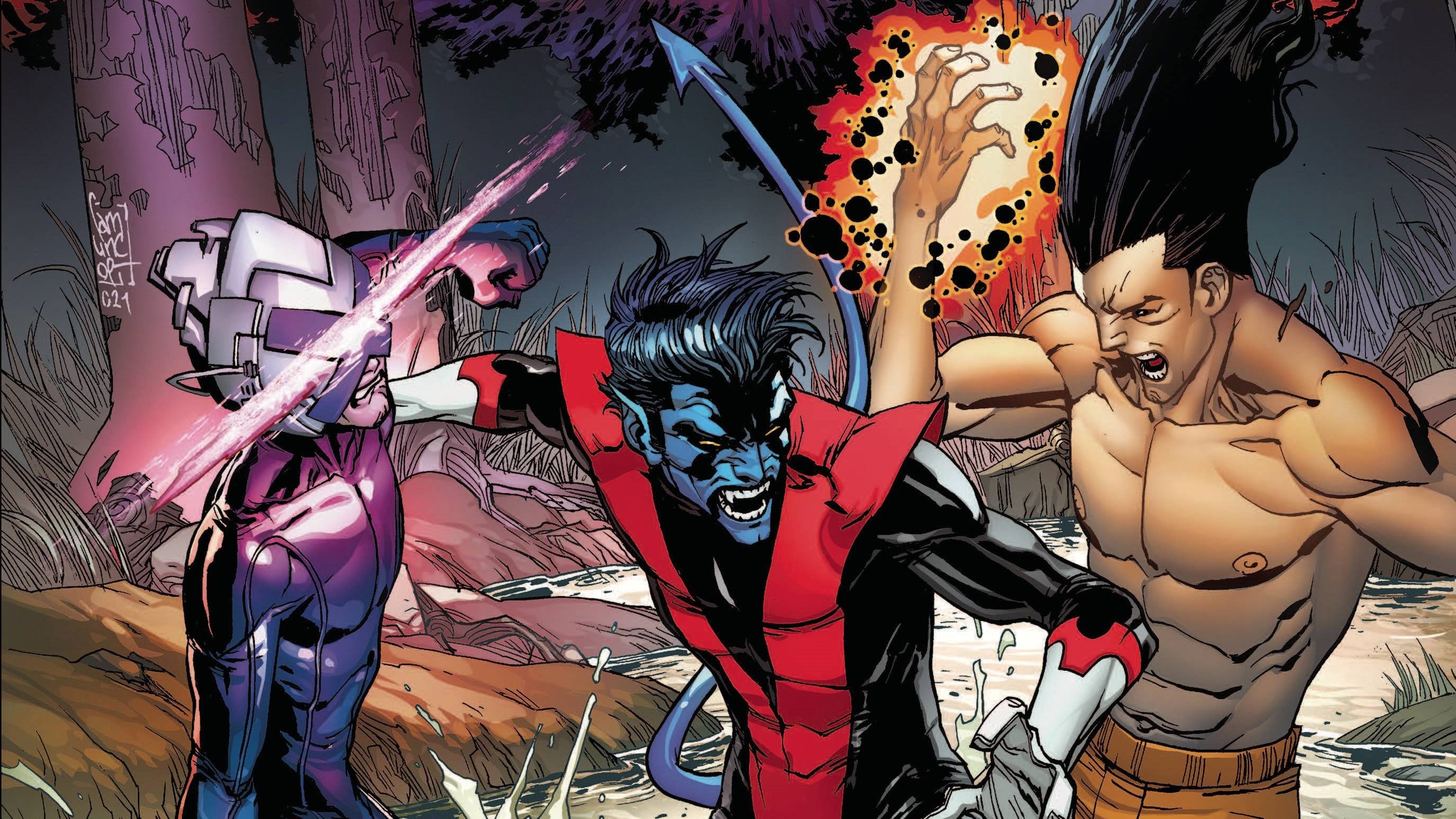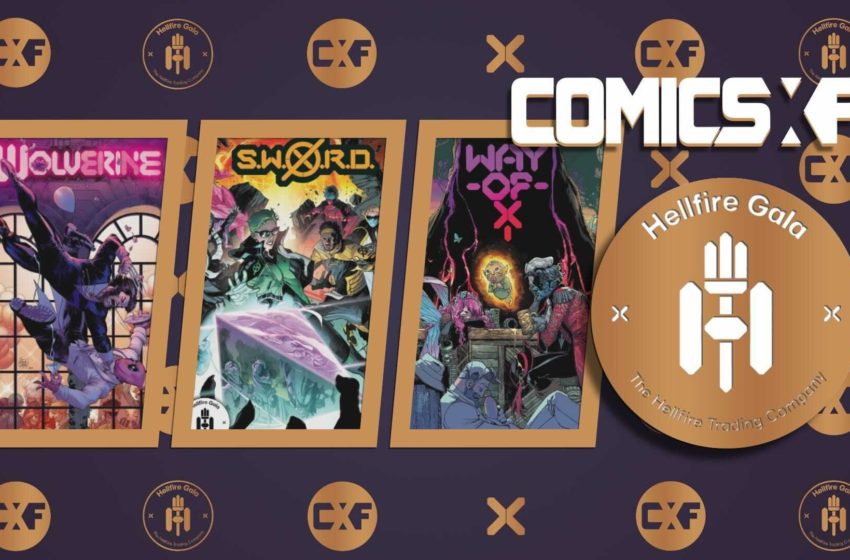He is many, but not The Patchwork Man. Legion guides our crew as Si Spurrier, Bob Quinn, Java Tartaglia, and Clayton Cowles chart a new path in The Way of X #2.
Jude Jones: This? This is good. This is very good. This is “let me dispense with the pleasantries and introduce some real meat and disorganization into this process and see what comes out.” This is not at all what I expected in the best way.
Once again, this is good. Very fucking good.
Anna Peppard: And once again, there’s lots of big questions to reckon with! So let’s get to it.
Do You Believe Your Eyes?

AP: I wasn’t sure, at the end of the last issue, whether this was really Legion, or a fake-out by someone else. Turns out it is Legion, and he doesn’t have time to play nice (does he ever?). He violently enters Kurt’s mind to extract some kind of gold stone that he colorfully likens to “dog piss on a tree” – evidence. He says that someone’s been mucking with Kurt’s subconscious.
I’m a bit floored by the massive implications of this reveal, but I’m going to leave it alone for now; Orchis is the most obvious potential culprit, yet my money’s on the truth being more complicated. That Kurt’s mind is a pirate ship staffed by various swashbuckler, clown, and priest versions of himself is funny, but also 100% accurate, both canonically and symbolically. Emma Frost saw something similar when she went inside Kurt’s mind years ago, and Kurt’s always been a performer with a particular fondness for pirates, particularly of the righteous outcast variety (his favourite film is Captain Blood, which stars Errol Flynn as a compassionate physician who’s forced to take up pirary after being unjustly branded a traitor and sold into slavery). This particular pirate ship is besieged by storms and tentacles, which Legion characterizes as a reflection of Kurt’s conflicted psyche. I would like to hear more about these wet and slippery conflicts. [Ed. note: Alas, we are a SFW site.] But unfortunately, once Legion finds that stone, we’re back in the graveyard, and there’s no time to ponder what we just saw, because Kurt’s got ten minutes to save the world!
JJ: I knew Legion wasn’t the big bad. It was too easy. Too on-the-nose. I did not, however, expect him to become so sympathetic so quickly. I did not expect the character, long portrayed as insane (as in he is literally not sane) to make all the sense in all the salient ways. And I did not expect Orchis to have ABDUCTED HIS BRAIN TO RUN MODELS ON HOW DO DESTROY KRAKOA.
And yet! It makes perfect sense. His mind, a cornucopia of infinite possibilities, where “anything is possible but nothing matters,” as the breeding ground for testing how to destroy a culture is, well, brilliant. How they got his brain, and how he was able to fend them off? It’s comics. Roll with it.
[Ed. note: Just for continuity context, after David erased himself from existence in X-Men: Legacy, he returned, unexplained, in Legion a mini-series that had no connection to anything David had previously experienced. Then David appeared as an antagonistic force against X-Man in Uncanny X-Men “Disassembled” before being briefly merged with X-Man and then sucked into Nate Grey’s utopian Age Of X-Man. However they got his brain, it was after all that.]
AP: Actually, this is exactly how I would expect Legion to function based on Spurrier’s previous writing of him: as a highly imperfect but deeply sympathetic figure ideally positioned to investigate and critique his father’s hubris (sometimes through his own similar hubris, but still). Legion has extremely complicated relationships with Krakoa’s central architects – his biological father Xavier, and Moria MacTaggert, who’s functioned as a foster mother in the past. Throw in additional complicated relationships with the precogs someone doesn’t want resurrected – Ruth Aldine/Blindfold (the love of Legion’s life) and her great-grandmother Destiny (who Legion sort-of killed) – and David Haller’s ideally positioned to add plenty of drama to this island. I won’t embarrass myself by making any specific predictions about where that drama will lead, but it should be a wild ride (as most things involving Legion tend to be).
This may be me getting overly philosophical, but I read that “anything is possible but nothing matters” line as being about more than Legion, or even Krakoa. Long before Krakoa, no one ever died in superhero comics, or at least, not for long. We all know that if a superhero can be used to tell (or sell) a new story, they always come back. Lots of people think this is bad – that death being temporary somehow cheapens the stories. That they matter less when death isn’t “real.” I’ve never agreed with that logic, and not just because I was so devastated by Nightcrawler’s relatively short-lived death, I stopped reading X-Men comics for over five years.
When you care about fictional characters – and the X-Men franchise is especially good at making us do that – everything matters. You feel their pain after a hard day or a romantic breakup or a death, even if you know they probably won’t stay dead or single, and that tomorrow’s another day, and you can re-read your favorite moments as often as you want. I continue to be intrigued by the way this series is using Nightcrawler – a character who’s always been a powerful reader surrogate – to explore how in a world without death, the day-to-day, including how you live and who you love, still matters. That can be an argument for why superhero comics matter, or even why stories in general matter. It could also be an argument for why religion matters; I can’t speak to that, though I do have faith in the power of stories.
JJ: I wholeheartedly agree with your analysis and I would add that this is why so many of us took Franklin Richard’s loss of mutant hood so personally: we connect not just with the characters, the allegory of the character: what they represent to us, and how they represent us on page. And yes, while we know all things can (and likely will be) retconted, it’s still painful when any connection is severed.
Careful Connections

JJ: Speaking of connections, this era has been centered around how people work within systems. How people, coordinated, can be more. Can be better. So I guess eventually someone – something – would have to figure out how to do the opposite. How to break the unity. How to break the system. And damned if Legion’s brain isn’t the perfect system to experiment on.
And the wildest thing? As morally reprehensible as this is, couldn’t you just see Beast doing the same thing under the auspices of Professor X? Are our heroes really that heroic? That’s Legion’s question, and he – we – trust Nightcralwer to find out.
AP: I can definitely see Beast doing something similar, and that makes me sad. Forget about Kurt’s lack of fun – remember when Hank used to be fun? (Yeah, me neither – it’s been a while.)
JJ: I love, love that Fabian Cortez is everyone’s whipping boy. And since he’s a facist (“I never hurt people, just humans”) I’m happy for him to stay that way.
I trust Si to make our gravity defying mutant lost into more than a punchline. So I’m letting the fact that her presence is becoming only a punchline pass. For now.
AP: I also very much hope Lost gets more character development. Discussing Way of X #1 on Twitter, Spurrier emphasized Lost’s agency within the Crucible scene – how she chose Crucible, and stood up to meet Magneto’s daggers. But you can’t give a character true agency without giving them backstory and motivation – by making them a real character, rather than a convenient foil.
In a related vein – I found myself doing a lot of frowning and anxious lip-chewing at the scene where Loa and Pixie are talking about going to the Gala with Mercury. Admittedly, this is perhaps less a reaction to the scene itself – which is cute enough, in an awkward teenager-y way – and more of a reaction to how much performative queerness there’s been on Krakoa, especially where non-cis-male characters are concerned. (Which is in turn bound up in the many strange X-Men-related omissions from Marvel’s Pride Month marketing.) I hope this isn’t just another tease, a gesture toward queerness that’s never actualized or given any significant focus beyond a glimpse of characters holding hands in the background of a crowded panel.
Don’t get me wrong – I know even the gestures are progress. I’ve been reading mainstream superhero comics long enough to remember when gestures toward queerness were basically non-existent, and celebrated with tears and glee the few times they happened. But we’re not in that place anymore. This is 2021, and this is Krakoa, a supposed mutant utopia. Everyone deserves better, but especially the queer folks who’ve been out there every day on social media and podcasts and platforms like this one supporting these X-books. No more empty gestures.
JJ: I had no idea Pixie had a magic dagger in her. But yes, she has a mini soul sword (like Magik since it’s, uh, from Magik?) that can disrupt and excommunicate psyches. Kurt is nothing if not resourceful.
AP: Kurt has first-hand experience with the efficacy of Pixie’s Soul Dagger. He’s been stabbed with it – by Pixie, who was being manipulated by Belasco’s daughter Witchfire into stealing the Soulsword which was, for a time, housed inside Kurt’s body. He’s also used the Soul Dagger – on Illyana, to save her soul from Witchfire. [Ed. note: Check out X-Infernus for more details, or conversely, don’t.]
What I’m saying is: Kurt is lying to Legion about not bringing Pixie on purpose. Which I love; Kurt’s cunning, tactical skills, and, yes, pragmatism, are too often overlooked, as though his defining morality precludes these things. That shouldn’t be the case, and isn’t here. Though Kurt’s been fairly passive in this series so far – letting things happen to him rather than taking initiative – we are seeing glimpses of one of the things I love best about him, which is his ability to roll with the punches. Sure, he has some intense emotional reactions here, but despite that, he always keeps moving. Being half-disintegrated by Legion? It takes him all of a panel to recover. Hauling his makeshift team out of the Green Lagoon with no time to spare while still being nice to everyone? Done and done. Falling into Legion’s horrific mindscape filled with superbeings feasting on each other’s flesh? No time to mess around; he can teleport and somersault and drop-kick his way through that, no problem. Pixie’s no slouch either, of course. She’s been the queen of cameos on Krakoa, but it’s great to see her truly back in action, pink soul fire-blasting her way through swarms of monsters and robots.
JJ: Let’s analyze what’s happening here. Legion has an infinite number of personalities inside of him, that can manifest an infinite number of abilities. David, as the core personality, regulates all of the other personalities in his mind. He does not necessarily control them; we have years of examples of him losing control. But, like a leader, he can coral them. He can focus them. He can, hypothetically, make them work as a unit (a skill a better father would have helped him develop, but I digress). Without his leadership, his mind’s personalities get antsy. Angry. And as we see in an illustrated internal narrative, they get destructive and deadly. Quickly.
Orchis sees this. Sees the potential for discontent if leadership is broken. And is clearly working on ways to introduce destabilization – disconnection – into Krakoa.
I talked last week about my Catholicism. How years of worship and association define me (and many folk from my city) culturally, even if I don’t ascribe to all the particulars of religion. It keeps me United. Connected. When I initially heard about Way of X, I simply thought about it in terms of making a religion. But now I see the vision and the stakes: Kurt needs to create a culture. A sustainable, moral, shareable culture, much like the culture that binds me to my ancestors, friends, and families no matter how physically far away I stray. “We before me”, not “me before we”.
Else the entire Krakoan experiment will fail.
No pressure. No pressure at all.
AP: I sort of hope it ends up being less about creating a culture than learning to better understand and appreciate the culture(s) that already exist on Krakoa, but I take your meaning, I think. It’s less about making rules than reinforcing those connections, maybe? I would lean toward this Kurt and Legion team-up becoming a critique of centralized (or paternalistic) authority. The Krakoans’ strength, like Legion’s, is in numbers and diversity, not singular, self-appointed leaders. But it’s probably too early to make that call.
Do You Believe Your Heart?

JJ: First, as was mentioned in our CXF Slack, having a former Nazi offer to euthanize a Jew is…not a good look at all. But I digress. [Ed. note: For clarity sake, Nemesis spent every year between working for the Nazis and joining the X-Men systematically murdering any Nazi he saw, so he’s pretty firmly against them.]
I wonder why Kurt was ok with pulling the trigger? That moment of catharsis looks to me like the moment when he loses one religion and gains “the way.” Again, having him oscillate between “killing is bad” and “killing is mercy” is jarring, and I’m still not sure I’m settled. But again, I have faith that it will make sense as we go deeper into the way.
That Legion’s resurrection is treated in messianic terms (while explicitly being treated as non-messianic) is interesting. What makes it different? Was it the agency? The fact that he chose to die and to come back on his own without aid? That his death was one of meaning (to live would have meant the death of many others) as opposed to one of frivolity? Did people sense his return because of something Legion did? Was it more? Again, I have questions like Kurt.
AP: One of the things I took away from the Legion resurrection scene, where we see mutants from across the island being drawn to the site for mysterious reasons, was the suggestion that the meanings we attach to life and death don’t have to be the sole purview of a single faith, religion, or worldview. Things like Crucible and the resurrection protocols mean different things to different mutants, and so should Krakoa itself. Every utopia is really a dystopia, which doesn’t discount the deeply affecting fantasies bound up in this safe space, but does point toward the importance of paradise not being a static ideal; a paradise that can’t accommodate doubt and dissent isn’t really a paradise. Xavier has often been strongly associated with control, while his son, Legion, represents the impossibility of controlling anything so unpredictable as the X-gene. In a way: the mutants of Krakoa are coming forth to bear witness to this ideological conflict, which they will all, at some point, need to reckon with.
I’ve been thinking a lot about Kurt’s decision to kill what was left of Legion’s body, and let him be resurrected on Krakoa. This might sound strange, but I can’t decide how much it matters? I mean – it’s obviously presented, narratively and visually, as a significant moment. Besides the way Legion’s resurrection is greeted on Krakoa, we see Kurt give up on asking god for forgiveness, and fire the gun in a solid black panel where he, what’s left of Legion, and the copious blood spatter are all colored in the same flat red. Besides the obvious symbolism (showing the blood on Kurt’s hands), rendering Kurt in a red silhouette emphasizes the visual demonic-ness he’s always fighting against being defined by. And yet, this isn’t Kurt abandoning all his principles; this isn’t him suddenly treating death lightly, or embracing all the things that upset him about Crucible. Tellingly, where Crucible is a public spectacle, Kurt makes everyone else leave the room, so that Legion’s death is private; he even looks away as he pulls the trigger.
Killing Legion is also framed, very explicitly, as an act of empathy. Before he does it, Kurt tells Legion he understands being uncomfortable with one’s mutant identity, relaying a story from his childhood about being teased with the name “Nightcrawler,” and how he reclaimed it as something empowering – a metaphorical death and rebirth. Kurt’s decision is also so obviously necessary, it’s barely a choice. Legion’s consciousness is no longer properly tethered to what remains of his flesh, and if Kurt doesn’t destroy that flesh, it could very well mean the end of the world. Which is a roundabout way of saying: while Kurt killing Legion is important, the how and why struck me as pretty solidly in-character. In the past, Kurt has literally sacrificed his soul to save the world, forever barring himself from heaven; he doesn’t make any hard decisions lightly, but he’s certainly capable of making them. I see this moment as signaling the complexity Kurt already had, rather than forecasting a brand new direction.
JJ: On the topic of old and new directions, the last page teases a familiar name as the big bad: Onslaught. There is a lot to be said about this mental mishmash of Xavier and Erik, probably more than we have room to cover here (basically, when Xavier tried to shut down Magneto’s mind, the “darker” aspects of Mags escaped into Xavier, creating an Omega level gestalt that took pretty much the entire Marvel universe, including Franklin Richards to best.)
His introduction is interesting on several levels: we see mutants working in unison, and Onslaught was maybe one of the first (if imperfect) examples of this. It’s also clear that the negative aspects of Xavier and Erik (arrogance, secret keeping, totalitarianism) are slowly breaking what they built apart; how apt that their negativity, simply amplified, simply accelerated, is the weapon formed against the nation. Do they have the ability to confront Onslaught if they don’t have the ability to confront and check themselves?
AP: You thought the introduction of Legion felt too on-the-nose at the end of the last issue – I felt a little of that about the Onslaught reveal here. But it’s still an interesting turn, that I confess I did not see coming. I’m curious about which version of Onslaught this might be – the classic Xavier-Magneto one, or something different? The way the Pathwork Man has emerged at moments of doubt and discomfort (such as when Lost becomes agitated in the bar), makes me wonder if this Onslaught will be composed of negative psychic energy from a variety of sources.
JJ: I guess we’ll find out soon enough. I can’t wait to see where the next step in this journey takes us.
X-Traneous Thoughts

- Krakoan Reads: The Joy Of X
- Next issue is the Hellfire Gala. Anything could happen, but one thing is certain: for the first time since the X-Men started living on Krakoa, Kurt will be wearing something that isn’t his superhero costume. This might seem like a silly thing to care about; most characters have been wearing their costumes all the time in this new world where everyone’s effectively a full-time superhero. But picturing superheroes out of costume has always been an important way of humanizing them, and humanization is especially important for characters like Kurt, whose bodies are often perceived as “monstrous.” Many Nightcrawler fans cherish his time out of costume for exactly this reason, and notice every time he’s wearing his costume in scenes where his teammates aren’t (this has happened a lot over the years).
- Maybe after the Gala Kurt could, like, wear a T-shirt sometime? Or whatever the mutant culture version of a T-shirt is. I’m easy as long as we get to see Kurt looking a little more relaxed and naturalistic, at some point.
- In interviews, Spurrier has been teasing an appearance by Stacy X. In case you don’t recall: Stacy X (or, more precisely, Kurt’s attraction to Stacy X) was a factor in Kurt’s decision to abandon the priesthood (before he realized he was also being manipulated by a religious cult). A reunion at the Gala could prove interesting.
- Legion thought Kurt’s mind would resemble “somethin’ churchy… with stained glass.” That sounds a lot like the tower Kurt’s been living in. But of course, Kurt’s mind doesn’t look like that at all. Curious.
- Did Kurt teleport all the way to Saudia Arabia? I’ll assume they took a gate most of the way, but this still raises questions about Kurt’s current abilities. Pixie says he can teleport “crazy far these days” but doesn’t specify when this happened, or how. A by-product of resurrection, perhaps?
- For the record: I (Anna) prefer Kurt being a short-range teleporter. I’ve always liked the idea of Kurt having to be more inventive with his powers because of their limits, and his teleporting being smelly and exhausting relates to his struggle with the cost/benefit of his mutations.
- I want our girl to have a better name than Lost. But then again, maybe I should be glad a character of color has a name at all (yes, you absolutely should read this.) Also, it looks like Lost’s powers only cause discomfort when she’s discomforted.
- I love knowing that all this is happening the day of the Hellfire Gala.
- Infighting within Orchis – looks like mutants aren’t the only ones with fraught internal politics.
- I (JJ) was going to say priests>>>> police, but as Anna reminded me, priests police bodies, minds, and souls in ways that are just as invasive as “police” police.
- That said, *just about* anything and anyone >>>>> police.
- Legion’s willingness to “pick up the pieces” is incredibly foreboding. So much so that I wonder: how much does he know? Sure, he’s openly saying he doesn’t trust his dad or Erik (and, to be fair, one doesn’t have to be a telepath to pick up on their nature), but I just wonder what else he senses? Who else he senses. I’m sure we will learn more, of course we will learn more, but I just want to stick a pin in that line.

